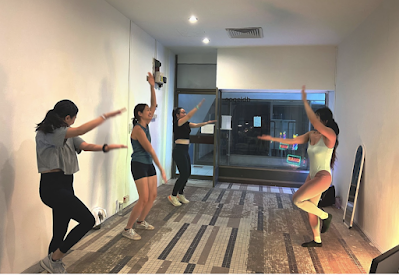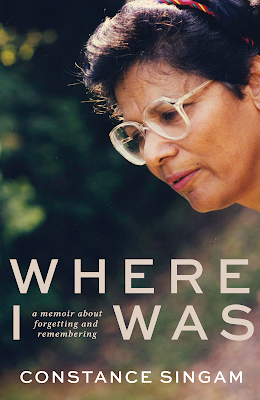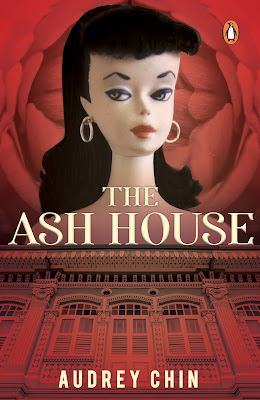 |
| Source:Wikicommons, Movie Poster |
Maxine Hong Kingston’s The Woman Warrior (The Library of America, repr. 2022) had this one line, “Girls are like maggots in the rice.” That’s not to say that all Asian women have it bad. Nor it is denying that Asian women labour to free themselves from the trampling foot of patriarchy.
It’s that an infinitesimal shift is in order: looking at Asian women in contemporary arts and culture, what they’re creatively producing, what they’re making, can tell us something new hopefully about how stereotypes are being dismantled, specifically, how a ‘badass’ Asian woman is being redefined. From Michelle Yeoh’s main role in Everything Everywhere All At Once to Kirstin Chen’s Counterfeit (William Morrow 2022) we are seeing a moment (arguably, cyclical) in the Asian feminist zeitgeist, a regional lens threaded through a global landscape, where female protagonists are challenging the straitjacket of how they should behave, and how they should ‘win’, without being held up as bearers of tradition or exemplars of ‘female’ or even ‘feminist’ behavior, but in fact, showing that being ‘badass’ means carving out space to be who you are, to do what you do, on your terms while embracing all your passion and imperfections.
In what ways then can we begin to conceive of the ‘badass’ Asian woman for our region? This month in a non-exhaustive focus for #SingLit, AsianBooksBlog spotlights works and voices who challenge, albeit break, the framework of how a ’badass’ woman should be defined.
Redefining the beauty code, the institutionalised female self
The code for ideal Asian beauty was spelled out by Queeny Chang in her autobiography Memories of a Nyonya (repr. 1982), an incredible glimpse into the life of the cloistered peranakan female in the early part of the 20th century : “slim as a willow, flat-chested, narrow hips and feet three inches long. She was to have a face shaped like a melon seed [kuazi lian], eyebrows curved, eyes like the autumn flow, a mouth like a cherry and nose too delicate to breathe.”
 |
| Installation Still. Courtesy of Kanchana Gupta |
 |
| Image still. Production of Desire (2021), courtesy of Kanchana Gupta |
In a recent exhibition at Objectifs Centre For Photography and Film, titled While She Quivers (10/2/22-13/03/22), Yanyun Chen interrogates the ‘externalised framework of the brutality and suppressiveness behind traditions, values and rituals’ through the cultural practice of the marriage dowry, thereby questioning female identity that’s made to revolve around the institution of marriage and all its connotations. The leftover woman, the educated woman, the virginal woman, the wife, the mother: Chen’s Stories of A Woman And Her Dowry show that these are constructs where rage and fear mingle to produce not more fear or rage, but a gentle grieving for our choices, limited or otherwise. As she writes in the exhibition catalogue: “How do I live with these inherited dowry objects?” In this same exhibition, Kanchana Gupta tackles the visual codes of female performativity and sexual desire in Bollywood cinema. Gupta’s The Production of Desire (2021) deliberately toys with and codes with her own body the elements of producing and purveying sexual fantasy catering to the male gaze. The image of her with shaved head, dressed in a saffron sari, is startling and memorable, at once rebellious and incongruous, imbricating ageism and health as contestations of the visual code for beauty and desirability; it also invites an Asian-intercultural conversation. Both Chen and Gupta are intent on shedding the self-evisceration from female cultural conditioning, and to migrate to a different sense of self, as yet undefined, only characterised by waiting and a becoming.
Redefining the Female Body
Yukiko Motoya’s eponymous short story ‘The Lonesome Bodybuilder’ tells the story of a lonesome housewife who takes up bodybuilding in the hopes of getting her husband’s attention, but as her body shape begins to bulk up, what changes is not just her marriage, but her relationship with her inner self.
 |
| Girl Sports Club Fitness Class. Courtesy of Sarah Lin Courtesy of Sarah Lin |
Young artist Sarah Lin explored our conception of feminine radical bodily autonomy and comportment in her collaborative work Girl Sports Club Singapore, where she organised fitness workout classes as part of her artist residency at dblspace (Peninsula Shopping Centre). Starting with thinking of muscles as an interwoven system, she delved into intergenerational conversations about the feminine body and Asian culture with the attendees of her classes. What she discovered were various notions they shared about comportment, motility and physical autonomy, as well as a surprising Freudian realisation about her own physical response to female versus male comments about her body. Interesting also were the projections of inadequacies made by older women onto younger women’s bodies.
Redefining Feminism
 |
| Book cover image courtesy of Ethos Books |
Writer and social activist Constance Singam is no stranger to controversy, particularly with regards to the 2009 leadership change in the Association of Women for Action and Research (AWARE), helmed by Singam as President at the time, and which Terence Chong in his book even labelled a ‘saga’. At the heart of this ‘saga’ is a philosophical difference between the old guard and new guard about Comprehensive Sex Education (CSE), with the Christian-led new guard claiming that the inclusivity in the CSE programme would result in ‘an entire generation of lesbians’. The point of this article is not to stir a hornet’s nest, nor to rehash a decade-past civil discord, but to highlight Singam’s recently published memoir, Where I Was: A Memoir About Forgetting and Remembering (Ethos 2022). In it, she retraces this episode from a personal perspective, and also takes more than a few potshots at the PAP. Her memoir also shares personal reminiscences about growing up between Kerala and Singapore, her marriage, being widowed, finding her feet again by returning to school. What comes across is her far-sightedness, and if courage is a necessary Joan of Arc trait for any trailblazing feminist, Singam has it in spades. The other side of courage is vulnerability, and Singam begins her memoir with a personal strategy she has developed when ‘looking at [her] life with a mixture of ….wonderment and…hopelessness’, that is, writing her way to understanding, ‘to build a bridge across this chasm of aloneness.’ She wrote essays on topics as divergent as “Faces of Feminism” (1993) to “Singapore: Where Racism is Normal” (2003), not afraid to stand up to injustice and jump into the fray of discourse. The light she shines on a Singapore past was one I enjoyed glimpsing, a Singapore both beautiful and flawed.
Breaking New Literary Ground: The Asian Feminist Gothic
 |
| Book cover image courtesy of Audrey Chin |
Highlighted also in this article is Audrey Chin who co-edited a book with Constance Singam titled, Singapore Women Re-Presented (Landmark Books, 2004), an exploration via essays, anecdotes and selected works into what it means to be a woman in Singapore. Chin’s recent novel, The Ash House (Penguin SEA 2021). earning the label Asian Feminist Gothic, has a cast of badass women ranging from a clairvoyant nun to a pipa-playing ghost to controlling aunts. Add a comatose Indonesian helper and fetishised Barbie dolls, and the ensemble is wacky and entertaining, with a story to raise the hair on your head. Asked who she considered the badass heroine here, Chin cited Bing Fa the pipa diva, but certainly, an argument can be made that there is more than one badass heroine in this fable. Indeed, why should any stage be dominated by only one heroine? The more the merrier.
Female Voices in the Vanguard
 |
| Book cover snapshot, Elaine Chiew |
The professional culinary world is known as a world of brawn and machismo, very male, characterised by the basic ability to lift ten-gallon stockpots and dismember a whole wild boar carcass. But Asian female and LGBTQ+ chefs like Kristen Kish (she), Melissa King (she/they), and Esther Choi (she) are altering that landscape irrevocably and unapologetically not just by their presence in the kitchen, but by bringing ‘ethnic’ elements into mainstream cooking in inventive, hybrid ways. Pamelia Chia’s cheffing experience at Candlenut tells a similar story: in the opening to her book Wet Market to Table (Epigram 2019), Candlenut owner Malcolm Lee calls her ‘a petite girl…able to singlehandedly helm the curry and chargoal grill…alongside the burly boys in the kitchen.” Chia takes a similar East-West vanguard approach in her recipes: witness her jambu tarte tatin, jackfruit compote with oats, and her soursop tres leches with passionfruit. She is also the founder of Singapore Noodles, a membership-based online cooking club exploring Singapore cuisine in a bid that arguably decenters the celebrity chef fad and democratises the culinary experimentation field. Members contribute their own recipes in cook-alongs. Podcasts and the emphasis on conversations testify to the importance of story-telling in rediscovering and revamping food heritage.
On the comedy front, female comedians in Singapore (nay, the region) can be as rare as hen's teeth. Poet, spoken word performer and comedienne Steph Chan enlivens the Singapore arts and culture scene with her poetry open-mic Spoke and Bird, providing a warm and welcoming space to new and seasoned poets to perform and share their work. Chan, who considers herself a feminist, also shared that performing on the comedy circuit has been "a long, fulfilling, exciting and sometimes exhausting and frustrating journey." With co-founder Marie Wong, she created Siao Char Bors Comedy, open to female and LGBTQ+ comedians and open Mic'ers. "The show had attracted a specific audience hungry for comedy that doesn't punch down. There is demand for more inclusive comedy." Spoke and Bird's next gathering will be July 22 featuring Verena Tay and Shivram Gopinath.
Owning It In Mental Health
 |
| Book cover image courtesy of Mahita Vas and Marshall Cavendish |
Last but not least is Mahita Vas’ A Good Way to Die: Inside a Suicidal Mind (Marshall Cavendish 2021), an honest no-holds-barred memoir about the toll of suicide ideation. Here Vas blows the lid clean off the taboo of silence on mental health, sharing very personal glimpses into what it’s like to live in the mind of someone with bipolar disorder on a day-to-day basis. Her book reminds us that on the other side of courage is a willingness to be vulnerable in front of others. It is a book that has sparked important conversations about mental health within the community, and we need more of these conversations, don’t you think?
As we continue to be reminded as recently as a Supreme Court decision, a woman's body is a battleground. Badass women who challenge and redefine rigid frameworks, conceptions, and spaces to be women from all angles, incorporating intersectional, queer and feminist perspectives, and at times at risk to themselves, deserve to be celebrated and supported. Do we do this? Do we do enough of this?
_____________________________
NB: Links to purchase embedded within text.

